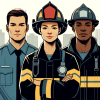Bad mouthing others within the organization is one of the most damaging things to any department’s morale and camaraderie, and it’s one of the most unbecoming and unprofessional behaviors anyone in your organization can exhibit. It breeds contempt and sets a negative tone throughout the department.
Bad mouthing is simply unacceptable. In spite of this obvious and known fact, the defamation of others is prevalent behavior in many fire companies.
There is a difference between light-hearted banter or trash talking and bad mouthing. Banter and harmless trash talking is part of firehouse life, and it usually occurs face to face.
Crossing the line
But the banter crosses the line when it becomes offensive to someone and it begins to call into question one’s character, integrity, work ethic, or other traits in a more seriously negative way.
Once the talk has a tone that is clearly coming from a place of animosity rather then being mutually playful and light-hearted, it is no longer acceptable in the open forum of the firehouse. If the officers in your organization are not doing their job and squashing this negative talk every time it starts, there are a few things you can do to help make a difference.
1. Don’t partake
Resist the urge to buy in and jump on the bashing bandwagon. Even if you may agree with some of the negative slander, do not partake.
Many try to be a part of the group and join in and this is where it becomes contagious cancer. Even if senior firefighters or officers are slamming someone, know that it is not OK and at the very least do not allow yourself to become a part of the problem.
2. Walk away
When someone starts bad mouthing others, walk away. Trash talkers need an audience.
By simply removing yourself, you’re removing the most important component they need to continue and sending a direct message to them and everyone else that you don’t want to hear it and it’s unacceptable. Even a silent audience can give the perception of approval, so walking away is even better then sitting silent.
3. Stand up for others
If you feel comfortable doing so, a simple acknowledgement of someone’s positives in the midst of a verbal assault has a remarkable way curbing and often halting the assault.
It sends a clear message that you do not agree with their opinion of that person. I call this playing the angel’s advocate. It shouldn’t come across defensive; it can be a simple statement, such as, “I think Joe is a pretty good guy,” or, “I think Joe is darn good firefighter.”
4. Ask the person to stop the bashing
Depending on your rank or place in the firehouse hierarchy, it may be a good idea to directly ask the verbal assailant to stop the bashing. In the case of an officer or senior firefighter, this should definitely be happening.
But even if you do not hold a rank or seniority, it may be time to start standing up and sending the clearest message possible. Send the message that you don’t want to hear it nor should anyone have to hear it. Bad mouthing is a cancer and you can do your part to stop the spread by directly standing up to it.
Weak justifications
I’ve often heard bad mouthing being justified. I’ve heard firefighters state, “I’m not saying anything behind their back that I wouldn’t say to their face,” This half-witted justification to go off on people is ludicrous.
For one, this statement is rarely true. The same words or tone are rarely used in someone’s presence. But more importantly, just because you would say it to them, or even have said it to them, does not mean you should or have the right to say it in their absence without given them the chance to even defend themselves.
The proper thing to do when you have an issue with someone is to approach that person in private and address the issues one on one. Discuss the issue and, whether resolved or not, it should not be discussed with others in a way that is intended to paint that person in a negative light or make yourself look superior.
Discussing issues in private and then later broadcasting it, “Yeah, I told that guy ...” is just as bad as verbally slamming them in an open forum or talking behind their back.
Stirring it up
If you have been guilty of bad mouthing, keep one thing in mind. Most of what you say about others in their absence will make it back to them at some point. Many Firefighters love to stir the pot, an equally bad behavior.
Instead of bad mouthing, pot stirrers like to spread the negative word of others, so it’s coming from someone else and not them. This often it pits firefighter against firefighter.
It’s just as destructive to morale as bad mouthing; it is bad mouthing. It’s bad mouthing with a scapegoat, which is an even more cowardly and damaging behavior then bad mouthing itself.
Keeping these things in mind when in the face of negativity towards another will help you to do your part to help your departments overall morale and help spare you from having your fellow firefighters see you as a potential verbal assailant in their absence.












